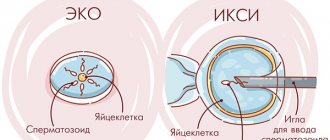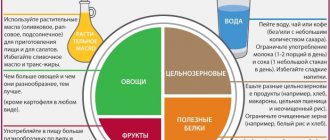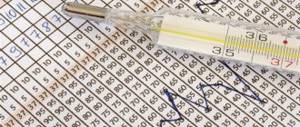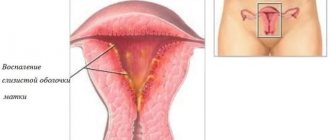PMS and its symptoms
PMS – premenstrual syndrome
. A syndrome is a collection of symptoms and signs of a disease that occur for one reason. That is, these are the symptoms that a woman feels during the period before the onset of menstruation. About 7 days before it starts. Some have less, some have more. Its symptoms may be the following:
- Headache
- Mood swings
- Drowsiness
- Irritability
- Breast tenderness
- Swelling
- Nausea and vomiting
- Excessive sweating
- High blood pressure
- Increased appetite
Many of you would add a dozen more symptoms to this list that are characteristic of them. This list can be continued endlessly. But right now I'm most interested in the last item on this list. I have long noticed that during the premenstrual period I have a wild appetite. I could eat often and a lot, and never felt full. I reassured myself that the body was storing nutrients for the menstrual period. I felt that I had gained 1.5-2 kg. in just a few days. The scales convinced me of this. Has this happened to you too? Then you will be wondering what is actually happening at this moment with the female body.
Menstrual cycle and its stages
Metabolism in the body () depends on many factors: gender, age, amount of muscle mass, time of day, season and various human diseases. In women, there are more such factors due to their physiology. It turns out that the level of metabolism in women varies depending on the stage of the menstrual cycle.
This dependence is caused by hormonal changes in a woman’s body at different stages of the cycle. If you didn’t know what the stages of the menstrual cycle are, then just remember the “calendar” scheme for preventing unwanted pregnancy, which many women use. The menstrual cycle is conventionally divided into 3 parts. In the second stage, the risk of becoming pregnant is maximum (ovulation period). And the first and third cycles are the safest. But this only applies to those whose menstrual cycle is stable.
How do the stages of the menstrual cycle differ from each other?
Stage 1
The first stage begins on the first day of menstruation. It is caused by a large increase in the female hormone estrogen.
As you know, it has almost the same effect on the female body as testosterone on the male body. The mood improves, performance increases, the metabolism in the body is at the highest level. This period is most suitable for those who want to go on a diet, work out in the gym and change their lives for the better. Of course, this does not include women with painful periods. Some experience such unbearable pain and related ailments that they resort to inpatient treatment in medical institutions. And, in general, this period is due to an increase in strength and mood.
Stage 2
The second stage is the beginning of the growth of the hormone progesterone.
This hormone is produced in a woman's body when she is preparing for conception, that is, during the period of ovulation. The concentration of the hormone is not yet very high, but it already has its own signs. Progesterone performs a protective function. It reduces the level of testosterone, the male hormone, so that new life can be born in the uterus. At this moment, all processes in the body seem to slow down and all forces are aimed at ensuring that conception occurs. We gradually lose the charge of energy that we experienced at the first stage of the menstrual cycle. Women usually during this period unconsciously strive for solitude and peace, protecting themselves and their unborn child from all bad weather.
Stage 3
Stage of maximum growth of progesterone
. At the same time, estrogen levels decrease. Now our body has decided that conception has occurred and its most important task is to maintain the pregnancy and promote its successful development. If you've ever been pregnant, you'll realize that the sensations you experience during the third stage of your menstrual cycle are very similar to those you experienced during pregnancy. When everyone tried to protect you, not worry you, and endure all your whims and mood swings. The only difference is that you are not pregnant and no one will stand on ceremony with you. During this period, a woman experiences an urgent need for additional energy, that is, calories. At the same time, her motor activity decreases in inverse proportion. Due to a slowdown in metabolism, excess fluid accumulates in the body, which leads to swelling. It is the third stage of the menstrual cycle that is PMS with all the ensuing consequences.
Risk group
PMS is still not a rule or a pattern. And, thank God, not all women are susceptible to this disease. Additionally, you are not born with this and there are some causes for this syndrome. There is a risk group that any woman who is susceptible to certain diseases can fall into:
- Miscarriage or abortion
- Taking oral contraceptives
- Gynecological surgeries
- Inflammatory processes of the reproductive organs
- Genital candidiasis
- Traumatic brain injuries
- Endocrine system diseases
- Sexual infections
In addition, there are also social and psychological factors for the occurrence of PMS. In modern society, a woman has ceased to be only the keeper of the home and family, when at any stage of the menstrual cycle she could follow the urges of her body - to retire when she wants, to sleep longer when she has no strength. Today a woman is everything! She is the director, she is the secretary, she is the breadwinner and the hunter, she is the breadwinner and the housewife, she is both the mother and the wife. She does not have time to live according to the needs of her body. This is why more and more women are experiencing PMS symptoms. So, the causes of PMS can be:
- Accommodation in major cities
- Intellectual work
- Presence of stress
- Chronic lack of sleep
- Insufficient physical activity
- Unbalanced diet
If you have noted at least one reason in your life, then you should pay attention to your body and listen to it. It is possible that PMS is the source of your excess weight.
How to avoid gaining weight with PMS
On average, during menstruation a woman loses about 250 grams of blood and more. Of these, about 50 grams of pure iron. What happens during the premenstrual cycle? We eat on average 500 kcal more food than usual. Since metabolism slows down and the body tends to accumulate reserves, fat deposits are guaranteed. Moreover, the quality of the food you eat leaves much to be desired. And there is no smell of iron at all. We are most drawn to sweets and starchy foods, that is, foods with a high glycemic index that do not give us anything other than increased blood sugar. It, in turn, is safely converted into fats. Voila! You have gained 1-2 kg. Of which, 1 kg. is a liquid, and 1 kg. – fat deposits.
How should you behave in each phase of the menstrual cycle in order not to gain excess weight?
Stage 1
. The best period for fasting days and physical activity. During the first stage, you can achieve the best results, both in sports and in nutrition. Don't waste time, use it every day.
Stage 2.
During this period, the goal is not to gain weight. It is necessary to reduce the consumption of sweets and starchy foods. Physical activity should be the most active. Here it is possible to include strength training in your training and force your muscles to burn calories not only during exercise, but also after it, during the recovery period.
Stage 3
. The most dangerous period for your figure. You feel a constant feeling of hunger. To satisfy your hunger, do not use sweet or flour products. They won't keep you full for long. Eat foods containing large quantities (cottage cheese, cheese, poultry, nuts).
Physical activity should continue, maybe not as intense, but still stable. You may feel tired, both muscular and psychological. Continue training, it will restore your spirits and increase adrenaline in your blood.
Be sure to eat foods high in iron (lean meat, liver, lean fish, seafood, cocoa, walnuts, almonds, dark chocolate, etc.)
Due to the fact that fluid is retained in the body, try to limit its consumption to 1.5 liters per day during this period.
- Do not exceed your usual calorie intake
- Eat small meals 4-5 times a day (about 200-250 grams at a time)
- Increase your protein intake
- Increase your intake of foods containing iron
- Mandatory physical activity
- Spending more time in the fresh air (raises hemoglobin)
- Weigh yourself every month in the first phase of your cycle (on the 7th day) in order to monitor your weight gain.
It doesn't seem that difficult. It becomes difficult when you suddenly discover a sagging belly and loose buttocks, swollen with fat. A woman’s body is a very complex mechanism and requires a special approach. Use all its features to your advantage and a slim figure is just around the corner.
There are days when it seems that everything is against us! Physical activity is hard, the scales are treacherously going off scale, your favorite skirt that you wore just yesterday no longer fits today! What's going on? The secret lies in the peculiarities of the menstrual cycle, which affects a woman’s appetite, metabolism, and physical endurance.
First phase of the cycle
(
menstruation).
Diet and weight loss.
At the beginning of the cycle, any diet is contraindicated. During this period, the production of large amounts of prostaglandins, substances that irritate the lining of the uterus and provoke the onset of menstruation, decreases and begins. At the same time, estrogen levels drop sharply. But this hormone takes part in the production of serotonin, the hormone of good mood. It is not surprising that at the beginning of the cycle, many women fall into depression and try to compensate for the lack of good emotions through sweets, which, as we know, do not contribute to weight loss. There is only one way out - replace harmful carbohydrates with healthy ones: fruits, vegetables, cereals, honey. But it is better to abstain from strong meat broths, tea, coffee and chocolate during this period, since they all enhance the effect of prostaglandins. True, if you really want something sweet, you can allow yourself a couple of shares of chocolate, but nothing more.
Not the best time to weigh yourself. Under the influence of hormones, fluid is very poorly removed from the body, and therefore the woman gains extra pounds. But not due to fat, but due to water, which accumulates in all tissues. Don't worry, after 5-7 days your metabolism will return to normal and the excess water will leave your body.
Physical activity.
In the first days of the cycle (days 1-7 of menstruation), physical activity is difficult. Women with painful periods have no time for sports at all. However, experts do not advise lying on the sofa all the time, since passive rest in a horizontal position reduces the tone of the uterus, thereby increasing pain. If you feel the strength to get out of bed,... After wandering around the park or city streets for at least half an hour, you will improve blood supply to the pelvic organs and relieve uterine spasms.
Getty Images/Fotobank
Mid-cycle ( ovulation).
Diet and weight loss.
During this period, nature planned the onset of pregnancy, and therefore the woman’s body produces a large amount of androgens - male sex hormones. Under their influence, metabolism increases, and therefore all diets bring excellent results. However, doctors do not recommend being too zealous. Remember, a lot of blood is lost during menstruation, and therefore switching to a strict diet will only worsen iron deficiency. To prevent this from happening, eat a balanced diet, not forgetting foods rich in iron (beef, apples, buckwheat, pomegranates, veal, liver).
Weight.
Ideal time to weigh yourself. After the end of menstruation, a woman’s hormonal background changes towards estrogen. All excess fluid is excreted in the urine, and the weight returns to normal.
Physical activity.
The woman becomes more resilient. She is active and resistant to stress. That is why on days 12-14 of the cycle (plus two days before and after) any physical activity, including extreme ones, is easy.
Second phase of the cycle (egg destruction)
Diet and weight loss.
If pregnancy does not occur during ovulation, then in the second phase of the menstrual cycle the death of the unfertilized egg begins. That is, if in the first phase of the cycle the female body was tuned to creation (follicle maturation), then in the second - to destruction. That is why the period from 15 to 20 days of the cycle is considered ideal for “destroying” fat deposits. Feel free to arrange fasting days for yourself or switch to diet food. However, a week before your period starts, you may feel a voracious appetite. This happens due to an increase in the level of luteinizing hormone (LH), which stimulates the release of the corpus luteum from the ovary. It is under its influence that mood and appetite change. Losing weight during this period will be especially painful, and the effectiveness of the diet promises to be very low. So don't bother yourself needlessly. It is better to refrain from simple carbohydrates (sweets and flour products) in favor of complex ones (whole cereals, wholemeal bread) and proteins (lean meat, fish). This will help you stay slim even without dieting.
Weight.
During this period, the weight is still normal, and therefore you can safely step on the scale. But at the end of the cycle, many women begin to complain of sweating. Weight gain (1-1.5 kg) is often observed. If you are prone to swelling, try to reduce the amount of water and salt you consume. Drink diuretic teas (birch buds, hibiscus, raspberry or linden). You can eat watermelons, strawberries, apples.
Physical activity.
The hormonal levels remain stable, the woman is cheerful and active, physical activity goes well. But towards the end of the cycle, under the influence of hormones, physical activity becomes more and more difficult. You shouldn’t break yourself by forcing yourself to play sports, as this can result in increased blood pressure or headaches.
Irina Chernaya
We thank gynecologist Natalia Lelyukh for her help in preparing the material.
For every woman, weight gain is an undesirable and unpleasant event, and if it also happens every month, then it’s time to think about whether everything is okay with your body.
Experts say that one of the features of female physiology is a change in weight shortly before the critical days. If your body weight has increased by no more than 3 kg and after the end of menstruation the weight returns to normal, then there is no need to panic. If body weight does not decrease after regulation, you need to look for a pathological reason why weight increases before and during menstruation.
How to avoid gaining weight before your period?
To avoid weight gain by the end of the cycle and during menstruation, you should adhere to the principles of proper nutrition. During premenstrual syndrome, women eat unhealthy foods (chocolate, flour, fatty foods, high-calorie foods) when they are in a bad mood.
In order not to gain excess fat before your period, you should follow the following dietary principles:
- exclude semi-finished products and smoked products (sausages, frankfurters, lard);
- do not eat fatty foods;
- stop eating fried foods (especially potatoes);
- exclude sweets and flour;
- remove saltines and snacks from the diet;
- limit alcoholic drinks as much as possible (they not only contribute to the appearance of edema, but are also very high in calories);
- add porridge, fresh vegetables and fruits to the menu;
- increase iron-containing foods in the diet (buckwheat, liver, pomegranates, seafood, spinach, oatmeal, legumes);
- reduce salt intake.
In the last phase of the menstrual cycle, moderate physical activity and exercise are recommended, such as walking in the park or morning exercises. Light activity that brings emotional satisfaction increases serotonin levels and reduces appetite. Meditation and yoga classes are good for relaxing and lifting your mood.
Premenstrual syndrome is often accompanied by irritability. To lift their mood, women begin to eat sweets to relieve stress. To reduce irritability, it is recommended to drink herbal teas with a calming effect (chamomile, lemon balm, mint, valerian). To reduce swelling, you can add diuretic herbs (lingonberry leaf, yarrow, birch buds) to tea drinks.
Internal factors for gaining kilograms
Most often, weight gain during menstruation is caused by processes that occur in the body before their onset. It is not for nothing that critical days received such a name, because before their arrival, the female body is actively preparing for a possible conception, as a result of which the hormonal background changes along with the metabolism. Weight gain before menstruation can be caused by a combination of the following factors:
- fluid retention in the body. The period of critical days is characterized by high fluid consumption, especially with heavy discharge. If intense menstruation is repeated from cycle to cycle, the body begins to prepare for dehydration and stores moisture. At this time, a woman may complain of swelling of the face and limbs. Typically, weight loss occurs immediately after menstruation due to the removal of fluid from the body. If the swelling does not go away after menstruation, you should take diuretics, and if the swelling is more persistent, you may need to consult a specialist;
- problems with the digestive system. Shortly before menstruation, the concentration of progesterone in a woman’s body increases greatly. This hormone has a relaxing effect on the uterine muscles, as a result of which the uterus presses on the intestines, causing an accumulation of gases, which can cause the abdomen to visually enlarge. For some women, constipation is a precursor to menstruation, and the accumulated stool causes weight changes. Usually weight fluctuations stop with the onset of critical days;
- insatiable appetite. Even with mild manifestations of premenstrual syndrome, most women experience hormonal disorders before menstruation, as a result of which there is a strong desire to eat as many harmful carbohydrates as possible, which include buns and chocolates. The situation is aggravated by the increasing concentration of progesterone, which can provoke attacks of hunger and real gluttony. If the appearance of extra pounds on critical days is associated with gluttony, then with the end of menstruation they will not go away on their own, but will accumulate from month to month, and will eventually develop into obesity;
- anemia. This disease is familiar to all women who are trying to overcome excess weight with the help of debilitating unbalanced diets. Such gastronomic experiments cause a drop in hemoglobin. When during menstruation the body, along with menstrual blood, loses about 30 mg of iron every day, the situation is further aggravated against the background of reduced immunity. Iron deficiency anemia can cause an acute feeling of hunger, which is accompanied by nausea and vomiting. In order not to increase body weight, such hunger attacks should be satisfied not with flour and sweets, but with seafood, liver or eggs.
Weight change on critical days
During menstruation, many of us face problems such as bloating, constipation, swelling and weight gain. Why does this happen, and how to prevent extra pounds?
Some unpleasant symptoms usually appear a few days before the start of menstruation. Pain sensations appear in the abdomen, dizziness, attacks of nausea, swelling of the legs, arms, joints, swelling of the chest and abdomen are possible.
Due to changes occurring in a woman’s hormonal background, appetite awakens during menstruation - this is inherent in nature. From about the middle of the cycle, the amount of the hormone progesterone increases in the body. This hormone is responsible for pregnancy, and a woman’s body naturally stores it for future use to produce healthy offspring.
A normal phenomenon is a weight gain of no more than 900 grams, which goes away after menstruation. However, many women, due to their greater appetite during this period, increase their weight by more than a kilogram. And, naturally, the extra calories settle on your figure. Since this happens monthly, excess fat gradually accumulates.
In order to protect your figure during critical days, listen to the advice of Passion.ru.
Don't be led by desire
If during your menstrual period you have a difficult desire to eat something forbidden, hang a sign in your kitchen with the words: “PMS will go away, but the weight will remain.” It will help you abstain from “junk” food.
Have an educational conversation with your man
Men also contribute to the gain of excess weight in their other half. After all, they have to deal with such unpleasant manifestations of premenstrual syndrome in their beloved, such as tears, hysterics, and bad mood.
And in order to somehow protect themselves from such manifestations, they are forced to pamper us with sweets; some are willing to run to the store for chocolate even at night. During the premenstrual period, women all over the world eat tons of chocolate products. Talk to your partner about this if you don't want these tiles to settle on your hips and waist.
Get ready to exercise!
Light physical activity can help reduce appetite. This could be either a 15-minute exercise in the morning or a dance class. It is very important that the training brings emotional pleasure, leaves a pleasant feeling of warmth in the body, and does not take all your strength.
Scientific studies have shown that exercise reduces appetite. This is due to an increase in the level of adrenaline and norepinephrine in the blood due to muscle work. In addition to the fact that these hormones help break down fats, they also help improve brain tone, reducing the body’s depressive mood. Accordingly, the body ceases to feel the need for food as an antidepressant.
Monitor your weight
Psychological reasons
Not only physiology is to blame for weight gain before menstruation, because in 90% of women, an unstable psychological state provoked by premenstrual syndrome can also lead to similar phenomena. A week before the critical days, your mood begins to change sharply; bouts of irritability can be replaced by complete apathy. And if a woman is sensitive to the topic of weight, then any fluctuation can provoke additional psychological problems.
Some women are subconsciously afraid of feeling menstrual pain again, which is why they are very worried about the onset of their menstrual periods. Lack of self-control and the desire to “eat up” your fears with tasty, but high-calorie food leads to the fact that kilograms are added before our eyes. An important role in this is played by others who, seeing a woman’s depressed or irritated state, try to appease her with chocolate or other sweets.
Sometimes women deliberately give in when they find out that weight gain before menstruation is a physiological process. But this is the “pitfall”, because if the weight gain is truly physiological, then after regulating the weight will normalize, but after overeating it is quite difficult to lose excess weight.
Natural causes of weight gain during menstruation, menstruation
The natural reasons why weight increases during menstruation, extra pounds appear during menstruation, is excessive accumulation of fluid in the body. This reason for weight gain is related to physiological problems, that is, it is not a sign of a problem. This situation most often occurs in those girls who, in most cases, have heavy discharge during menstruation, that is, when their periods are heavy. Excess fluid, that is, fluid retention in the female body provokes the appearance of edema. Such symptoms are stressful for the female body, because... Excess fluid during menstruation can be distributed throughout the female body, which is why weight increases and excess weight appears during menstruation. Increased appetite during menstruation also affects weight gain during menstruation, so women who are overweight are advised to stick to their regular diet and not overeat during menstruation.
A problem such as anemia during menstruation also indirectly affects the appearance of excess weight. With anemia, a woman often experiences severe hunger, because... The body thus gives a clear signal about its specific needs. Due to forced overeating, the total weight may increase slightly and differ from the usual indicator. Changes in digestion before the onset of menstruation occur due to the fact that a sharp increase in progesterone occurs in a woman’s blood. Because of this, the process of relaxation of the uterus may occur and, as a result, constipation and accumulation of excess gases, all this leads to a slight increase in the woman’s weight.
How much weight can you gain?
Experts cannot say what the exact norm for weight gain is during menstruation, since weight increases depending on the woman’s genetic predisposition. It is impossible to overcome such a root cause with medications and strict diets. As studies have shown, the predisposition due to which weight is gained during menstruation is laid in the female body at birth.
But not only due to heredity and the characteristics of the female body, body weight increases during menstruation; uncontrolled consumption of food and liquid on the eve of and during the period also contributes to weight gain. In order for the increase to be insignificant, you should be attentive to changes in gastronomic preferences on the eve of critical days and avoid consuming unhealthy foods and dishes.
Does weight increase during menstruation?
A unique creation of nature - a well-coordinated mechanism called the “female body” - is designed in such a way that every month, under the influence of special female hormones, cyclical changes associated with the function of procreation occur. Moreover, these periodic metamorphoses affect the operation of absolutely all systems. Such changes become more noticeable a few days before the appearance of menstrual flow - this is the premenstrual syndrome familiar to most women.
The unpleasant symptoms of PMS consist not only in the appearance of physical and emotional discomfort, but before the onset of your period, you immediately gain several extra pounds. During your period, weight always increases, no matter what diet you follow and how actively you exercise to lose weight. You can also gain one or two kilograms during ovulation.
How much does weight increase during menstruation?
Weight gain during menstruation is initially due to genetic predisposition. From birth, every woman’s body has an individual program for going through the monthly menstrual cycle and all the ailments that accompany it. Whether you gain one kilogram or three kilograms during women’s days depends solely on the characteristics of your body.
However, it is incorrect to consider genetics the only reason for the increase in body weight before KD - weight gain during menstruation is directly determined by the amount of food and liquid consumed on the eve of the onset of menstruation. Therefore, it is so important during menstruation not to deviate from the usual diet and constantly monitor the amount of food consumed so as not to gain weight.
Wines in sweets
During menstruation, cravings for sweets, especially chocolate, may increase significantly, this is due to a decrease in hemoglobin in the blood. To prevent sweets and flour from affecting body weight, hemoglobin should be raised during this period with iron-containing preparations or products.
In the second half of the menstrual cycle, an increase in progesterone levels is observed, and with the arrival of menstruation it drops sharply, while the production of prostaglandins, substances that promote endometrial detachment, increases. In addition, the level of estrogen, which ensures the secretion of the hormone of happiness, serotonin, sharply decreases. A woman’s mood may deteriorate, but what can best lift it? Of course, sweet candy or a fresh bun. But replenishing the serotonin deficiency with sweets has a negative impact on the female figure; in this situation, a woman should curb her appetite with a couple of slices of dark chocolate or make an effort and give up junk food in favor of slow carbohydrates (porridge and vegetables).
How much does weight increase before menstruation?
This is genetically determined - it is different for every woman. But the increase can reach 2 or 3 kilograms. The main thing is to endure this minor upset with steadfastness and not lose your temper over the goodies. “Burn the barn - burn the house”, she’s already gained weight anyway - not our principle. Just wait a couple of days and your normal weight will be restored.
How to eat during menstruation?
But we must warn you that in addition to weight gain due to tissue swelling, there is another problem - hormone surges often provoke uncontrollable appetite. The danger also lies in the fact that during the KD period the metabolism naturally slows down, and all the excess in the form of cakes and sausages goes straight into fat! Therefore, during your period, it is better not to follow the lead of your stomach. But there is no need to be atrocious. You should not work hard these days, exercise with heavy weights or run long distance races. Yoga lovers are advised to refrain from complex “inverted” poses during the KD period. Read more about the features of training during menstruation in this article. Everything is discussed here in great detail, be sure to read it.
As for nutrition, as we have already said, try to deviate from the “course” as little as possible. Treat yourself to treats, but in moderation. Avoid salty foods and alcohol. But strict restrictions on food are also not welcome - this can negatively affect the functioning of the female body.
Let’s just say that it’s hardly possible to lose weight during your period (and is it even necessary), in any case, you won’t see the plumb line these days for sure. The main thing is not to gain weight!
Proper nutrition
There is no need to start losing weight immediately with the arrival of menstruation; at this time, the protective functions of the female body are reduced, and strict diets can only worsen the general state of health. In order not to gain weight, the main thing is that the diet at this time is balanced. There are several tips for creating a menu for the period of regulation:
- 7 days before the expected menstruation, you need to increase your fiber intake, it will relieve swelling. You should add apples, legumes and vegetables to your diet;
- You don’t need to drink liquid for about an hour after eating; it further stretches the stomach, helping to further increase portions;
- serotonin can be increased by eating the right foods: bananas, tomatoes and corn;
- You need to consume iron-containing foods and fermented milk separately from each other, since they are not absorbed together, which leads to a loss of strength and a desire to “jump off” the diet.
For a diet to be effective, it should not bring negative emotions to a woman. And since during menstruation there may be sudden upward changes in weight or weight loss (the “plateau” effect), you need to take into account the rule not to weigh yourself during menstruation.
Causes of weight gain
Women are interested in the fact: Why am I gaining extra pounds, does weight increase with mensis temporarily?” There are several reasons for this phenomenon.
Before the onset of menstrual flow, the level of progesterone and estrogen in a woman’s body increases. An increase in hormones entails many changes in the body.
Fluid retention
Failure of hormones provokes water retention in the body, in addition, it can cause constipation and disturbances in the functioning of the intestines. The rectum becomes very relaxed, which leads to constipation. After the end of menstruation, everything returns to normal. The intestines are cleansed, excess fluid leaves the body.
Changing your diet
As soon as ovulation occurs, the level of progesterone in the female body increases greatly; before the start of the cycle, estrogen and progesterone drop to their lowest levels. Such indicators negatively affect a woman’s condition. They make her feel depressed. In an attempt to improve her mood, a woman begins to eat a lot and gives preference to sweets. During this period, it is very difficult to establish control, so the mass increases.
Enlarged uterus
Why does weight gain occur before menstruation? The weight may increase due to the preparation of the uterus for fertilization of the egg. The uterus is preparing for a possible pregnancy, blood vessels grow, and their inner layer thickens. Due to this, the volume of the uterus increases.
There is no need to worry about weight gain during menstruation; as soon as your period is over, the excess fluid will disappear. Bloating and constipation will also disappear.
Those girls who are unable to moderate their appetite even after menstruation should be careful. In such a situation, the weight is gained more than normal, the weight gain will not stop at two kilograms.
In order for the gained weight to go away completely after your period and not have an extra half a kilogram left, you need to follow some rules.
- Monitor your weight, control your weight daily, especially during menstruation.
- During periods of depression and bad mood, you should not eat negative emotions.
- Review your diet and exclude from the menu all foods that are not beneficial.
- The best option for nutrition during menstruation is to create a menu for yourself that would include all the components necessary for the body.
How much does weight increase during menstruation? So many factors will depend on lifestyle.
General rules
It doesn’t matter why a woman gained weight before or during menstruation, following the general rules will help reduce it:
- do not eat fatty, fried and salty foods. Eliminate mayonnaise and sauces, replace them with vegetable oil in small quantities. Avoid alcohol, canned goods and baked goods. These foods retain fluid in the body;
- instead of excluded foods, you need to eat vegetables, fish and wholemeal bread;
- you need to limit fluid intake in the evening, since tea, coffee or a bottle of mineral water can cause the development of edema;
- A lack of nutrients can provoke an increase in appetite. If you take calcium and magnesium supplements, you can significantly reduce the symptoms of PMS, eliminate swelling, swelling of the abdomen and mammary glands. Pharmacies sell special vitamin complexes that normalize the functioning of the entire body during this period;
- It should be remembered that in the first half of the menstrual cycle, weight loss occurs faster, and in the second half, the weight loss process may slow down and even stop;
- Do not forget about moderate physical activity; during this period you can do gymnastics, swimming or dancing.
In order for regulation to stop bringing discomfort and negative emotions, you should control your weight and prevent overeating.
It happens that a woman who steps on the scale every morning may notice increased readings in the period before menstruation. At this point, the question arises whether weight increases before menstruation. In most cases, weight gain before menstruation is a completely normal and natural phenomenon. Let's look at the causes of excess weight and ways to combat them.
Weight gain before menstruation: root causes
The answer to this question lies on the surface. The reason for weight gain before menstruation is hormonal changes in the body. Constant fluctuations in hormonal levels are directly related to a woman’s cycle. Let's take a closer look at exactly how periods affect weight.
- Such changes provoke fluid retention in the body. Often women suffer from constipation due to relaxation of the muscles of the rectum. This is one of the reasons why weight increases before menstruation. Immediately after menstruation, constipation goes away and excess fluid also leaves the body.
- During menstruation, weight increases due to uncontrolled appetite. The amount of estrogen fluctuates according to the following principle. As you know, immediately after ovulation its level drops sharply. During this period, the mood noticeably worsens and you really want to lift it with sweets. It is not for nothing that a chocolate bar during this period becomes the most obvious solution to all problems.
- Progesterone. Afterwards, its level rises sharply. Then it returns to normal again after a couple of days. And just before the onset of menstruation, the levels of both hormones are at a minimum. Therefore, the female body needs sources of joy and calm at the same time. It is at this time that weight gain occurs before menstruation as a result of uncontrolled appetite.
What to do if weight increases during menstruation?
It is clear that you cannot control hormonal changes. But this does not mean that weight increases before menstruation and there is no way to prevent this. To start, try replacing cakes or other baked goods with fruits and vegetables. They are lower in calories and will also help remove excess fluid from the body. It is very useful to eat a banana during this period: the amino acid in its composition promotes the formation of the “joy hormone” serotonin in the blood.
If you haven’t quit your diet and prefer healthy foods, but still haven’t been able to understand why your weight increases before your period, another method will suit you. Talk to a specialist about birth control pills. The hormones they contain balance the hormonal balance in the body and help control weight.
During menstruation, many women face problems such as weight gain and bloating, constipation and swelling. Why does weight increase during menstruation and what can be done about all this - we’ll talk about this further.
Why do you gain significant weight before your period?
Why do you gain weight before your period? This question is asked by some ladies who are jealous of their weight. This problem exists in almost all women. When you want to lose weight for the beach season, every gram of your own weight counts. And then, literally a few days before your period, the scales show very disappointing numbers. Some representatives of the fair sex even report bloating before menstruation.
To ensure that weight gain on the “red days of the calendar” does not lead to panic, you need to figure out why you are gaining weight during this period.
Weight gain due to fluid in the body
Before menstruation, hormonal changes occur in a woman's body. They lead to all the negative consequences, including weight. During this period, women also complain of pain in the lower abdomen, mood swings, and discomfort in the mammary glands and lumbar region. This is due to the hormones estrogen and progesterone. The peak of progesterone production occurs just on the 20-24th day of the menstrual cycle. During this period, the body gets rid of the fluid entering it more slowly. It lingers, causing a feeling of heaviness and swelling.
Fluid retention is one of the most common signs of premenstrual syndrome. It affects about 70% of women of childbearing age and almost all pregnant women. There is a medical theory according to which the slow elimination of fluid during these periods is a protective reaction of the body. This is how it prepares for a possible or already pregnancy and protects the body from dehydration.
Fluid retention in the body is also worsened by addiction to salty foods. To avoid double stress on the body during menstruation, it is better to go on a salt diet about 10 days before menstruation.
Refusal of semi-finished products, sausages, and canned food will help solve the problem. They contain a lot of salt. Alcohol, carbonated water and confectionery also retain water in the body.
Many women prefer not to change their diet, but to use diuretic medications. It is better not to do this, but to replace medications with natural products from the refrigerator. Thus, tomatoes, cranberries and cranberry juice, lemon, pineapple, pomegranate, beets, parsley, garlic, radish have a diuretic effect. Eating these foods on the eve of your period will help remove excess water from your body and avoid weight gain.
There may be other reasons why weight increases on the eve of critical days.
Return to the topic Weight gain due to increased appetite
A woman with PMS may not notice how quickly she eats cookies, sweets, cakes and other goodies. The same hormonal changes in the body are to blame. Therefore, only those who are completely confident in the unchanged nature of their diet can blame fluid retention for weight gain. Increased appetite is another “companion” of premenstrual syndrome. Why is this happening?
There is a theory according to which during the premenstrual period women's metabolism accelerates and the need for calories increases. They subconsciously empty the refrigerator in an attempt to fill this gap.
A more convincing theory is that increased appetite before menstruation is the body’s preparation for a possible pregnancy. Nature has thought out all the mechanisms very well. Before menstruation, the concentration of certain female hormones increases (they were already discussed above). They affect the hunger center in the brain, changing its functioning. Hence the increased appetite. That is, nature made sure that before a possible pregnancy the body did not experience a deficiency in nutrients, ensuring the gestation of the fetus.
Therefore, you shouldn’t be surprised at the inflated readings on the scale: the mechanism of small weight gain before critical days is thought out by nature.
Return to zmist The trash of bowel movements
This can also be the reason why women add 1 to 3 kg on the eve of their period. And this is where these notorious hormones work. Under their influence, the intestinal muscles relax, peristalsis is not so effective, and the urge to go to the toilet becomes less frequent. This is also nature's defense mechanism. The body is preparing for a possible pregnancy. In order for the survival of the embryo to be greater, the body “turns off” the smooth muscles, since they are located in the uterus. Therefore, many representatives of the fair sex also note constipation as one of the manifestations of PMS. And since the intestines are cleansed less often, this can also lead to weight gain. For this reason, bloating appears before menstruation.
Delayed bowel movements can be combated. It’s best to start with physical exercise: jumping rope and the well-known “bicycle” exercise will help relieve constipation. Circular stroking of the lower abdomen with pressure, as well as taking one teaspoon of olive or sunflower oil on an empty stomach, will have a beneficial effect on intestinal motility. Constipation medications should only be used in extreme cases. Firstly, they can be addictive, the intestines are “cooked” and will no longer work independently. Secondly, laxatives cause a very strong effect, which can be found outside the home, causing a lot of inconvenience.
Return to zmistHow to avoid extra pounds?
Every woman asks herself this question. Even before menstruation, this trouble can be avoided. Most likely, a minimum increase for a swollen uterus will still occur, but you can avoid “sticking” 2-3 kg of excess weight. To do this, just follow a few simple recommendations.
As mentioned above, salty foods should be avoided. Your diet should be enriched with fresh vegetables and fruits, nuts, and grains. But it’s better to give up coffee in favor of green tea.
No one has yet canceled willpower. If unexpected readings on the scales before critical days are very upsetting, then you need to use your self-control to the fullest and look into the kitchen for something tasty as little as possible. During periods of “appetite exacerbation” it is better not to be at home. A walk in the park, the city, cycling, rollerblading is an excellent alternative to overeating at home. Physical activity works wonders. It can also help with problems such as weight gain.
Often, gynecologists at appointments advise women to take oral contraceptives. They practically eliminate all manifestations of premenstrual syndrome. The tablets contain certain doses of sex hormones, which allows you to avoid their surges throughout the menstrual cycle. According to statistics, most representatives of the fair half actually note an improvement in their condition: they are no longer bothered by pain in the lower abdomen, and there are no unpredictable changes in weight. Therefore, hormonal pills can be a good way to combat this problem. Now the pharmaceutical industry is producing a new generation of drugs, from which you do not gain weight, but, on the contrary, even gain weight. Before taking hormonal pills, consultation with a doctor is required. It is possible that you will have to try several options before you can choose the most suitable one.
To avoid problems with weight in the run-up to your period, weight loss experts advise not weighing yourself often—it’s enough to do it once a month after your period. Then the scales will show the exact weight.
Nature has thought out everything very well in a woman’s body. If you gain weight on the eve of your period, then it is necessary. You should conduct experiments with your body very carefully.
A balanced diet and reasonable physical activity will help you avoid gaining extra pounds during the premenstrual period and avoid problems such as bloating before your period.
Even if such a nuisance occurs, do not despair. This is a reason to work on yourself after your period in an intensive mode.
Causes of weight gain before and during the menstrual cycle
Experts, first of all, see the root causes that provoke an increase in the weight category, increasing weight, in changes in hormonal levels, determined by the course of the cycle. Next, let's look in more detail at how exactly menstruation affects weight gain:
- The changes themselves that occur in the body provoke abnormal fluid retention - often women experience problems with going to the toilet, constipation, and swelling. This is one of the root causes that provokes weight gain before and during menstruation.
After the critical days pass, the weight often returns to its previous parameters.
- Often these most critical days provoke a woman’s uncontrollable appetite - this is a normal reaction, a preparatory stage for a possible pregnancy. In most cases, this is a consequence of ovulation and changes in estrogen levels.
- Progesterone - after ovulation occurs, the level of this hormone increases. It is the fluctuations of both of these hormones that provoke uncontrolled appetite before and during menstrual periods.
In addition to hormonal changes in the body, the level of body weight before and on the dates of critical days can be influenced by such factors as:
- diet and metabolic processes occurring in the body;
- a woman’s genetic predisposition to excessive weight gain;
- how flexible the rhythm of her life is.
But for the most part, it is the hormonal background that determines fluctuations in kilograms and their excessive gain during critical days. This is how the body prepares for the future maturation of the follicle and the release of the egg, conception and gestation, and compensates for the loss of fluid and blood, vital macro and microelements.
Losing weight during menstruation
You need to approach the issue of weight loss during menstrual periods with all responsibility. Due to blood loss due to menstruation, a woman constantly loses much-needed iron for the body. A deficiency of this element leads to the development of anemia (decreased hemoglobin levels) with all the symptoms accompanying this disease: weakness, malaise, drowsiness. Therefore, weight loss and the menstrual cycle must be coordinated.
Plus, against the background of the predominance of progesterone before menstruation, many women suffer from excess gas formation and constipation, which also requires nutritional correction. In addition, to lose weight, you need to think about physical activity. Experts do not recommend intensive exercise in the gym, but note that walking or light jogging will only benefit a woman.
- Milk thistle - medicinal properties of the herb. Uses of milk thistle
- Amiksin - instructions for use of tablets. Indications for taking Amiksin for adults and children
- How to bake apples in the microwave
Is it possible to lose weight during menstruation?
Some experts strongly recommend abandoning the idea of losing weight during your period. This position is largely dictated by fears for the health of women who are especially demanding of their own figure. At the same time, nutritionists say that losing weight correctly during menstruation is not at all forbidden. In fact, during critical days it is only forbidden to be overly involved in diets and exercise equipment. Otherwise, there are no visible contraindications.
Is it possible to fast during menstruation?
Complete refusal of food in order to quickly lose weight during menstruation is extremely harmful to women's health. Against the background of bleeding, this method of weight loss may lead to a worsening of the condition. For this reason, fasting during menstruation in order to effectively lose weight cannot be done. Thus, refusing coarse fiber will cause the limbs to swell even more. A lack of calcium will cause increased pain in the abdominal area, and magnesium will cause pressure surges.
Diet during menstruation for weight loss
The nature of nutrition seriously affects the process of weight loss during menstruation. It is important to understand that losing weight during menstruation has slightly different goals from ordinary restrictive measures. So, eating during this difficult period for a woman is aimed at maintaining the vitality of the body and replenishing lost minerals, proteins and vitamins. As a result, a diet during menstruation for weight loss should be based on a vitamin diet with a limited calorie content, which will help, if not lose weight, then maintain the same weight. A woman’s diet must include:
- meat;
- fish;
- eggs;
- cereals;
- vegetables (especially cabbage, lettuce);
- bran;
- fruits (citrus fruits (oranges), apples, bananas);
- bitter chocolate;
- dried fruits;
- coffee (no more than a cup per day).
Gymnastics during menstruation
Exercising during menstruation is very beneficial. However, there are some limitations. Thus, women are not recommended to do exercises aimed at strengthening the abdominal muscles. Safe ways to lose weight are to exercise on a treadmill, elliptical machine or exercise bike. Pilates is also considered useful for menstruation. Yoga deserves special attention. So, during menstruation, twisting of the spine is extremely undesirable.
In addition, to maintain water-salt balance in the body, one should not forget to drink plenty of fluids. In the quest for slimness, it is better to give up sweets. If you clearly understand that you are starting to gain weight and cannot lose weight, you should not be upset and drink “handfuls” of sedative pills. It is better to reconsider your diet and start doing gymnastics during menstruation, including the following exercises:
- Take a horizontal position. Place your legs perpendicular to the wall. Fix the pose. Repeat the exercise 4-5 times.
- Lie on your back and press one leg with your hands to your stomach. Hold this position for 5-7 seconds and then change legs. The exercise can be performed 4-5 times.
- Doing the “bicycle” and “scissors” exercises will help you lose weight more effectively.











